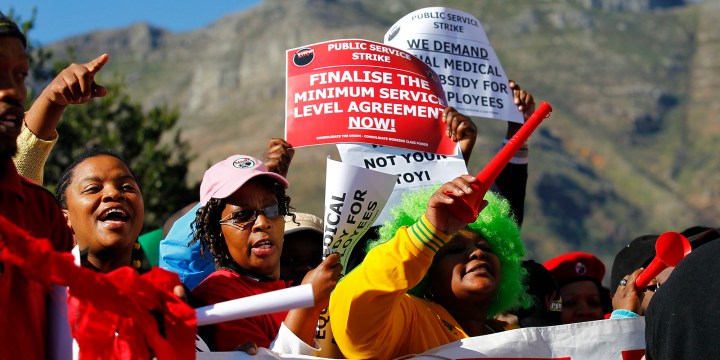PAY TALKS
Public sector unions pare down wage demands to end impasse with government

The latest development in negotiations is that the unions are prepared to trim down their wage increase demand from 10% to 6.5% — even below consumer inflation, which measured 7.4% in June.
Wage talks between the government and unions representing public servants have been unusually cordial, possibly an indication of improved labour relations in the public sector.
The government has remained firm in rejecting the 10% wage increase demand for 2022 that was tabled by unions representing 1.3 million public servants. It made a counter-offer of an increase of 4.5%.
Given historical trends, unions would normally be frothing at the mouth and immediately issue a threat of strike action that would shut down public schools, hospitals and police stations.
But this time the unions have not issued such a threat, opting instead to find common ground with the government through more negotiations.
They have even pared down their remuneration demands to accommodate the government’s difficult financial situation. The latest development is that the trade unions are prepared to revise their demand from 10% down to 6.5% — even below consumer inflation, which measured at 7.4% in June.
Public sector trade unions made this concession after wage talks deadlocked when the government initially rejected the double-digit increases in the wages of state doctors, nurses, teachers, police officers and others.
Agreement ‘the bottom line’
Reuben Maleka, the general manager of the Public Servants Association, which represents more than 230,000 public servants, told Business Maverick that lowering the demand to 6.5% was done in the hope of reaching an agreement with the government.
“It’s our final bottom line to reach an agreement,” said Maleka.
The next round of negotiations is expected to begin on 3 August at the Public Service Coordinating Bargaining Council (PSCBC), where both parties negotiate the conditions of employment in the public sector. At the meeting, the government is expected to give its response to the unions’ new figure.
The unusual calm in the latest public sector wage negotiations has been the antithesis of what has happened in other spheres of the labour market and economy.
Workers at Eskom secured a 7% wage increase after they downed tools, supported by the National Union of Metalworkers of South Africa and the National Union of Mineworkers — the actions of which threw the country into darkness through intensified rolling blackouts.
Workers at the South African Revenue Service (Sars) have been on strike for two months because the tax collection agency has rejected wage demands of between 10% and 12% tabled by unions, among them, the Public Servants Association. The timing of the strike at Sars is unfortunate as the 2022 tax collection season is in full swing.
Sibanye-Stillwater is still recovering from a three-month strike in its gold mining division that shut down operations and stunted gold production levels.
Government finances
The government seems to have rejected the public sector unions’ initial 10% increase demand by trade unions because public finances are facing growing pressure, from taking on a large portion of Eskom’s debt (at least R200-billion) to finding ways to fund a basic income grant.
“We are becoming sympathetic to the government’s financial challenges. This is why we are prepared to reduce our demands and make them affordable,” another union boss told Business Maverick.
Instead of agreeing to a 10% pay hike, the government has proposed that it continues to award public servants an after-tax cash gratuity (or bonus) of R1,000 a month in 2022, which would cost the fiscus R20.5-billion.
National Treasury has budgeted for the cash gratuity in its 2022/23 expenditure framework, and was always prepared to extend it for another year if it didn’t agree with unions about their remuneration demands.
Along with the cash gratuity, public servants would receive a 1.5% pay hike known as “pay progression”, which is ordinarily awarded to public servants for their years of service or performance and pencilled in every year. The cash gratuity and 1.5% “pay progression” would translate to a 4.5% wage increase for public servants, the government has argued at the PSCBC.
But trade unions went into negotiations from a weak position, considering that the Constitutional Court ruled that the government could backtrack on a 2020 agreement that gave public servants an 8% wage increase, because it could no longer afford to comply with it.
“The government reneging on the 2020 wage deal has led to a distrust between trade unions and the government. And this environment tends to weaken the union’s power going into negotiations.
“A precedent has been set by the court that allows the government to walk away from agreements it cannot afford,” said labour lawyer Michael Bagraim. DM/BM


















Comments - Please login in order to comment.